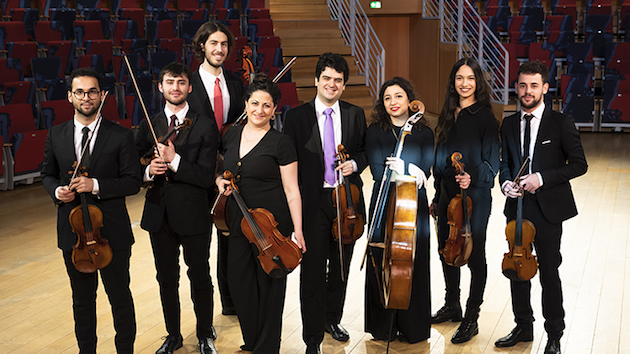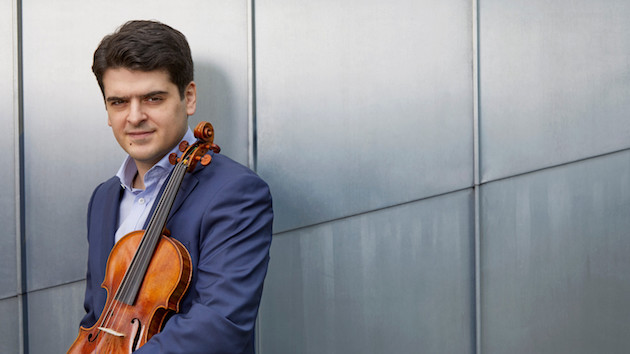
The West-Eastern Divan Ensemble, which made its debut Stanford Live appearance at Bing Concert Hall on Wednesday, March 4, is a new project of violinist Michael Barenboim, who leads the group of eight string players. They’re drawn from the members of the similarly-named orchestra, which was founded two decades ago by philosopher Edward Said and Barenboim’s father, conductor and pianist Daniel Barenboim. The groups have the same purpose: to use music to unite society and foster healthy relationships by bringing together musicians from the diverse and often contending nations of the Middle East in peaceful cooperation. Thus, the musicians of the Ensemble have backgrounds from Israel, Palestine, Lebanon, Jordan, and Egypt.
So there they were in Bing, playing two of the most exquisite monuments of large-scale 19th-century string chamber music: Felix Mendelssohn’s Octet in E-flat, Op. 20, and Johannes Brahms’s Sextet in B-flat, Op. 18. Both works received big, hefty, rough-featured performances. There was no trace of the gemütlich charm and rhythmic snap that often feature in performances of the Brahms, or of the hidden emotions peeking out at moments that can make both pieces works of intense drama.
These performances were exciting in a different way. They were full of busy cross-talk among the instruments, with inner lines from viola or cello suddenly popping out with buzzing intensity. Jumps in dynamics and strong sforzando accents were equally aggressive. Huge stormy surges alternated with light quiet passages so hushed that the sound seemed to arise subliminally.
Yet the result wasn’t chaotic. While each instrument expressed an individual voice, they all took harmonic and melodic direction together and ended up in the same place. Rich unified chordal passages, all the more pungent for the variety of instrumental textures, frequently emerged.

The first-chair solo parts in the Brahms Andante gave the clearest picture of that variety. Astrig Spidak Siranossian’s cello was full and resonant. Miriam Manasherov put grit into her viola lines with a touch of exertion pulling at her bow and some hesitations for emotional effect. Barenboim as first violinist had a far smoother and more straightforward style, bright and shiny. As the first violin part dominates the Mendelssohn Octet, his character did most to shape the piece. Barenboim’s steely lead, eloquently high-pitched but without the sense of strain some players bring to the punctuating high notes, made for a more controlled performance than the Brahms.
Still, there were surprises in style in the Mendelssohn as well. There was that fleeting Scherzo in extreme pianissimo. The Andante was emphatically mournful and anguished, like a visitor from one of Mendelssohn’s darker string quartets. And the finale, though big and rough in playing style, lived up to its Presto tempo marking by being as dazzlingly fast and fleeting as the Scherzo.
There was more to the program than those two masterworks. The Ensemble is touring with a newly commissioned octet by Benjamin Attahir, a French composer with Lebanese roots. It’s a single movement about 17-minutes long titled Jawb. Attahir here craftily exploits the characteristic sound of the ensemble. The work begins with long, slow Sibelius-like lines building from the cellos upward, then erupts into anxious growls and clicks, interspersed with fierce chordal phrases and an airier section with solos for Barenboim over a more delicate backing. All of these sound qualities were typical of the Brahms and Mendelssohn as well, this time cast into a tougher modern idiom that’s still linear and coherent.

The remaining piece on the program was something quite different. Barenboim came out and played Giuseppe Tartini’s “Devil’s Trill” Sonata in G Minor all by himself, without even any continuo. The effect was, of course, a little like a J.S. Bach solo violin recital, except that Tartini, though Bach’s contemporary, doesn’t write like Bach, and Barenboim doesn’t play like a typical Bach soloist either. Tartini’s violin line is untidier and wilder than Bach’s, and Barenboim played it in a determinedly hefty, intense, personable manner, with a level of drive and expression that might seem out of place in Bach.
This may have been the last chance listeners had for a concert in Bing’s main space for a while. Due to the coronavirus outbreak, Stanford is expecting its programs to shut down all public events seating more than 150 people for the next month, subject to change as needed. This concert was the last one at Bing to slip in before the shutdown took effect. It was not heavily attended, but at least those who were there heard a worthwhile performance.




